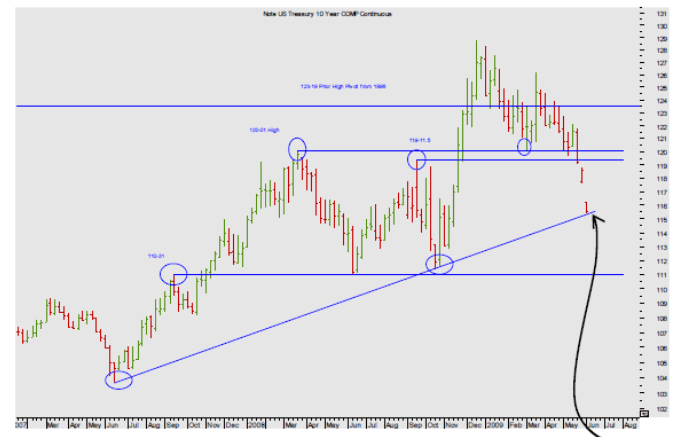Stock and Bond Market Update
Stock-Markets / Financial Markets 2009 Jun 05, 2009 - 11:45 AM GMTBy: Seven_Days_Ahead
 Last week we compared bonds and thought that T Notes were a good sell. They have fallen further - are they still a good sell? Some doubts have arisen…
Last week we compared bonds and thought that T Notes were a good sell. They have fallen further - are they still a good sell? Some doubts have arisen…
The Technical Trader’s view:
WEEKLY CONTINUATION BAR CHART

The market pull back from the long term 123-19 high, and the collapse back through the prior highs 120-01 and 119.11.5 set the bears running last week. But, in the continuation chart, the rollover into the September contract has exaggerated the fall and brought the market to the rising diagonal support at 115-16.
It looks extended. And vulnerable to a rally back.
DAILY SEP 09 CHART

This is less exciting than either the weekly continuation chart or the Jun 09 day chart. Because there is a less clear Double Top - if one at all. And though’ there is a small
Head and Shoulders continuation pattern in place, the move from that pattern has come up against the substantial support from the Prior High at 115-15. And of course that coincides
with the support from the rising diagonal in the weekly continuation chart.
We would not be big sellers until both supports at 115-15 were broken.
Wait for a clear confirmed breakdown from here before adding to shorts.
The Macro Trader’s view:
The Macro Trader’s Guide has long talked of the emergence of a bear market in bonds, driven by spiraling budget deficits in the advanced economies and fears of a renewed burst of inflation once growth gains traction.
While the US, UK, Euro zone and other governments were right to stimulate their economies through fiscal measures when an economic collapse and deflation seemed heavily on the cards, that same emergency stimulus needs to be removed as soon as it is clear recession has passed and growth is gaining traction.
It is, indeed, a matter of urgency that governments prepare for recovery and normalize their fiscal stance, because at the same time fiscal medicine was administered, monetary medicine was being applied in large doses.
The real risk is that Central Banks will be too late in tightening policy. They are in the front line for two reasons:
- Quantum easing has meant the creation of new central bank money,
- Fiscal easing has pumped billions into the economy.
While tightening monetary policy is a quick tool to deploy, quantum easing will be slow to unwind. But that only addresses the concern over inflation. Ultimately, the fiscal stance needs to be brought back onto a sustainable path too. Markets that have accepted the need for emergency measures during the financial crisis will not tolerate slack fiscal policies once recovery is clearly under way.
The demand governments are placing on bond markets, if not addressed, will result in higher bond yields and in some cases, the authorities may fail to cover their funding needs. This happened to Germany and the UK earlier this year and has happened to Latvia this week. The Latvian situation caused a plan to be hatched in the EU for the Union itself and other large economies such as Germany to agree a facility to cover the funding needs of countries like Latvia and others in distress, such as Ireland, Portugal and Greece - if they are unable to fund their own government deficits.
In the US, Ben Bernanke warned Congress yesterday that the US cannot and must not, for competitive reasons as well as funding concerns, go on running large federal deficits for long periods once recession is over.
In short, as the leading economies show signs of emerging from the worst of the recession and, in some cases, show early signs of growth, policy makers on both sides of the Atlantic, including the German Chancellor, are calling for a re-think on the current fiscal policy stance.
We judge it will take time to correct and reverse the fiscal measures taken. And even when policy is changed, the impact will take time to filter through. In the interim, markets will get nervous and investors will demand higher bond yields to encourage them to buy the large tranches of debt on offer, and to cover the increased risk of an outbreak of inflation.
The next few months could prove difficult for bond markets and we sense yields will rise sharply from here.
Mark Sturdy,
John Lewis
By Mark Sturdy
Seven Days Ahead
Be sure to sign up for and receive these articles automatically at Market Updates
Mark Sturdy, John Lewis & Philip Allwright, write exclusively for Seven Days Ahead a regulated financial advisor selling professional-level technical and macro analysis and high-performing trade recommendations with detailed risk control for banks, hedge funds, and expert private investors around the world. Check out our subscriptions.
© 2009 Copyright Seven Days Ahead - All Rights Reserved
Disclaimer: The above is a matter of opinion provided for general information purposes only and is not intended as investment advice. Information and analysis above are derived from sources and utilising methods believed to be reliable, but we cannot accept responsibility for any losses you may incur as a result of this analysis. Individuals should consult with their personal financial advisors.
© 2005-2022 http://www.MarketOracle.co.uk - The Market Oracle is a FREE Daily Financial Markets Analysis & Forecasting online publication.



